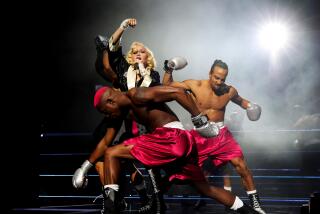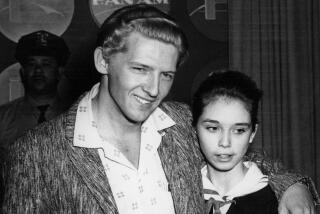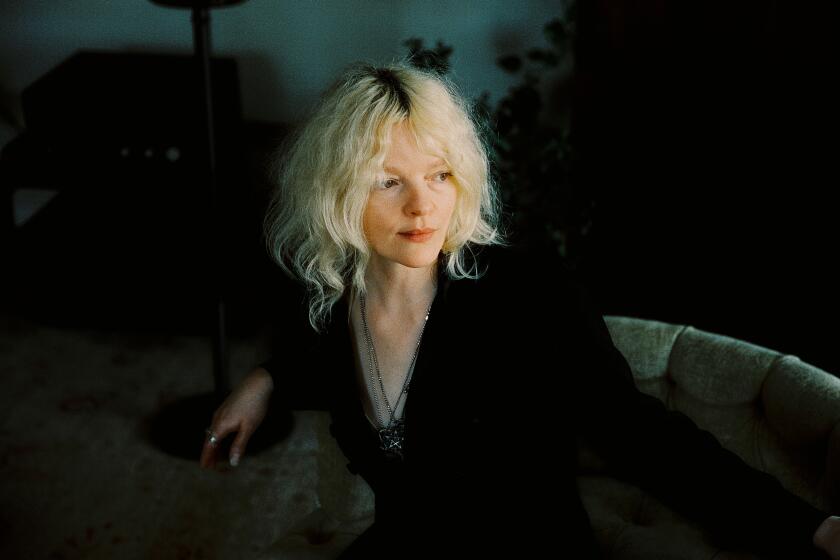Sonic Youth Takes Its Notes From the Underground
There’s the Manhattan of Woody Allen and Donald Trump, all Gershwin sweep and skyscraper grandeur.
Then there’s the Manhattan on the inside cover of Sonic Youth’s new double album, “Daydream Nation,” where the four band members are seen in front of a forbidding backdrop of graffiti-covered brick and tomblike doorways barred with corrugated metal.
“I love that,” Sonic Youth singer-guitarist Thurston Moore said about the photograph in a phone interview this week. “It was taken right down the block from where I’ve lived for 6 years. I find that very romantic.”
Romance amid the squalor has been a theme of New York City rock since 1967, when the Velvet Underground issued its debut album (the one with the Andy Warhol banana on the cover) interspersing accounts of heroin addiction and sadomasochistic sex with open-hearted love songs.
Now, in the late ‘80s, Sonic Youth is the band doing the most to carry on the rich tradition of the New York City underground that began with the Velvets and Lou Reed and carried on through the ‘70s with such influential rockers as Television and Patti Smith.
Sonic Youth, which plays Friday at Night Moves in Huntington Beach, was formed in 1981 with Moore and Lee Ranaldo on guitars and Kim Gordon, Moore’s wife, on bass (drummer Steve Shelley is a more recent addition). Originally, the band was part of New York’s “No Wave” rock movement, known for music built with imposing blocks of amplified guitar noise. But over the course of its more recent albums--”Evol,” “Sister” and now “Daydream Nation”--Sonic Youth has come to shape its feedback blasts and strange guitar harmonics into something approximating the pop song form observed (with occasional digressions) by the Velvets and their ‘70s progeny.
“It’s just lately that people say we’re expanding on (the New York underground rock tradition), and we find it very flattering,” Moore said. “That’s one of the most exciting things, that people are putting it in that light.”
Moore, who is 30, said the band did not make a deliberate decision to draw upon a tradition that lately had been appropriated by such non-New Yorkers as the Jesus and Mary Chain. “It wasn’t a forced thing--’Let’s be a New York band that carries the flag’-- but it comes out that way, and I’m happy about it because it’s something I was very close to,” he said, as a suburban Connecticut teen-ager who grew up on Reed, Smith, Iggy Pop and Television.
The New York environment in general also could be playing a part in the clangor and assaultiveness (but carefully structured clangor and assaultiveness) that mark Sonic Youth’s music.
“It’s an extremely noisy city; it’s a very rude city also,” Moore said. “I have a lot of trouble going back there. For the first week after a tour, it’s an extremely irritating situation for me. It takes a while to get back to ignoring all the horrible aspects of it. I sometimes think I would like the whole band to move somewhere in the middle of Arkansas.”
Moore sees one big difference between Sonic Youth and some of its New York predecessors, notably Lou Reed. Some of the earlier bands tended to live out their songs’ visions of romance and squalor with extreme real-life behavior. “With the Velvet Underground, you think about depravity a lot. We definitely don’t deal with situations of depravity. We’re pretty much a milk-and-cookies outfit.”
But a band whose repertoire includes a song about the Manson murders, a graphic re-creation of a fatal car crash and troubled internal meditations tinged with thoughts of violence and sexual guilt certainly doesn’t sound like milk and cookies.
And with “Daydream Nation,” Moore said, the band decided to tackle politics: “The original title was going to be ‘Rock ‘n’ Roll for President.”
It’s an album without conventional political commentary in the style of Billy Bragg, Sting or Tracy Chapman. But it does have a clear platform for rock music and its alter ego, sexuality, to be taken not only as metaphors but also as actual means for cutting through individual or national torpor with a sudden shot of vitality.
“The world is dull, but not today,” Ranaldo intones in one song, and it’s a theme that Sonic Youth reiterates in driving compositions scattered with exhortations in favor of change, of jumping off into the unknown.
It is a platform almost as far from the pop mainstream as it is from the political mainstream.
Sonic Youth records for an independent label, Enigma/Blast First, but its new album is getting a distributional push from one of the major companies, Capitol/EMI-America. Blast First’s West Coast representative, Ray Farrell, says that the arrangement has helped “Daydream Nation” achieve greater visibility.
But Moore recounted one recent flare-up that illustrates the potential for misunderstanding.
“Some people from Capitol in Canada came to see us with no idea of our history,” Moore said, relating a story about a label representative who tried to interrupt a performance to run a contest giveaway.
“We though it was totally crass. She tried to come on stage, and Lee turned on his (electronic effects) foot pedal and blasted her off.” Asked to announce a raffle winner, Moore awarded the prize instead to the fan in front of the stage who seemed to be enjoying Sonic Youth’s show the most.
“The people from Capitol were furious,” he said. “They said, ‘This is the most unprofessional band we’ve ever had to deal with.’ It’s the kind of thing I enjoy.”
Spoken like a real New Yorker. Or maybe just a real rock ‘n’ roller.
Sonic Youth plays Friday at 9:30 p.m. at Night Moves, 5902 Warner Ave., Huntington Beach. Admission: $12. Information: (714) 840-6118.
More to Read
The biggest entertainment stories
Get our big stories about Hollywood, film, television, music, arts, culture and more right in your inbox as soon as they publish.
You may occasionally receive promotional content from the Los Angeles Times.







